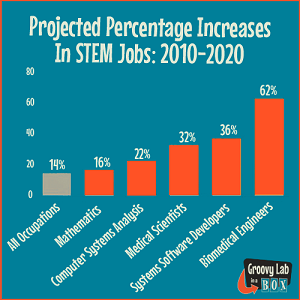February was National STEM month, and you've probably heard a lot about STEM, STEM education, and STEM careers? But what is STEM? And why is it important to you? We'll try to explain.
What Is STEM?
STEM stands for Science, Technology, Engineering and Math. It's a term used to encompass a variety of studies -- and, more recently -- an entire group of careers. You've likely heard about it in regard to education. The U.S. has fallen farther and farther behind other countries in many of these educational areas, and so the focus has been on getting our kids back into being competitive with a global market of very talented and bright future scientists and engineers.
As a parent, that means that we'll be bombarded with messaging about how important it is to provide our kids with opportunities to develop essential skills that will be the foundation for future learning in these fields. What they do as little ones most definitely can have an effect on what they can learn in secondary educational classrooms.
As a homeschooler, there is even more pressure to try to find learning opportunities that build STEM skills for the future. Many products and programs will be sold to us with the hope of filling in the gaps in current education and helping our kids become both comfortable with math and science learning and also competent.
Answering "What Is STEM?" for Your Family
In the photo above, you can see me as a child. I'm surrounded by my cousins, who all got the same kind of doll for Christmas.There is nothing wrong with dolls. (In fact, I believe there are a number of dolls for boys that can help develop healthy skills.) But I was very clear that I wanted a chemistry set for Christmas. I circled the one I wanted in the BIG Book from JCPenney that year. I asked Santa for it. And, I was delighted when he brought it to me. By listening to my requests for STEM-related hobbies, my parents were doing their part in ensuring that even a tiny little girl who liked to spend way too much time playing alone in her room could learn and grow. I didn't end up going into a STEM field (I'm a writer), but I homeschool kids who may. The critical thinking skills I learned from this chemistry set are still used today!
Here on LillePunkin', I often review and share my family's homeschool experiences with items in the STEM category. Since the category is so broad, almost any product or course that requires the kids to think critically or use scientific method can be considered a STEM product. Some are much better than others. There are many exciting opportunities right now for parents to buy products and try out services that they can use at home. You do not have to be a homeschooler to do so. Afterschool, weekends, and summers are a great time to supplement their STEM learning with innovative and memorable activities that build skills and -- more importantly -- help them develop a passion for this type of learning.

Since it is common knowledge that girls aren't as likely to go into STEM fields as boys, there is also a pressing need to get girls into these learning opportunities earlier. You'll see that many of the products on the market are designed for girls, but that doesn't mean that boys can't learn from them, as well. In fact, there is quite the discussion around the true answer to the question "What is STEM?" Some experts claim health-related fields, such as nursing, are not truly STEM fields. Try telling that to my daughter who has had to take courses in biology, chemistry, and physics!
Now that we've answered the question "What is STEM?", you've probably wanted to know some ways to incorporate STEM learning into your homeschool or home. We're putting together a best of STEM resources for families soon. Stay tuned for our take on our favorite items in a variety of price ranges!





Comments
Post a Comment